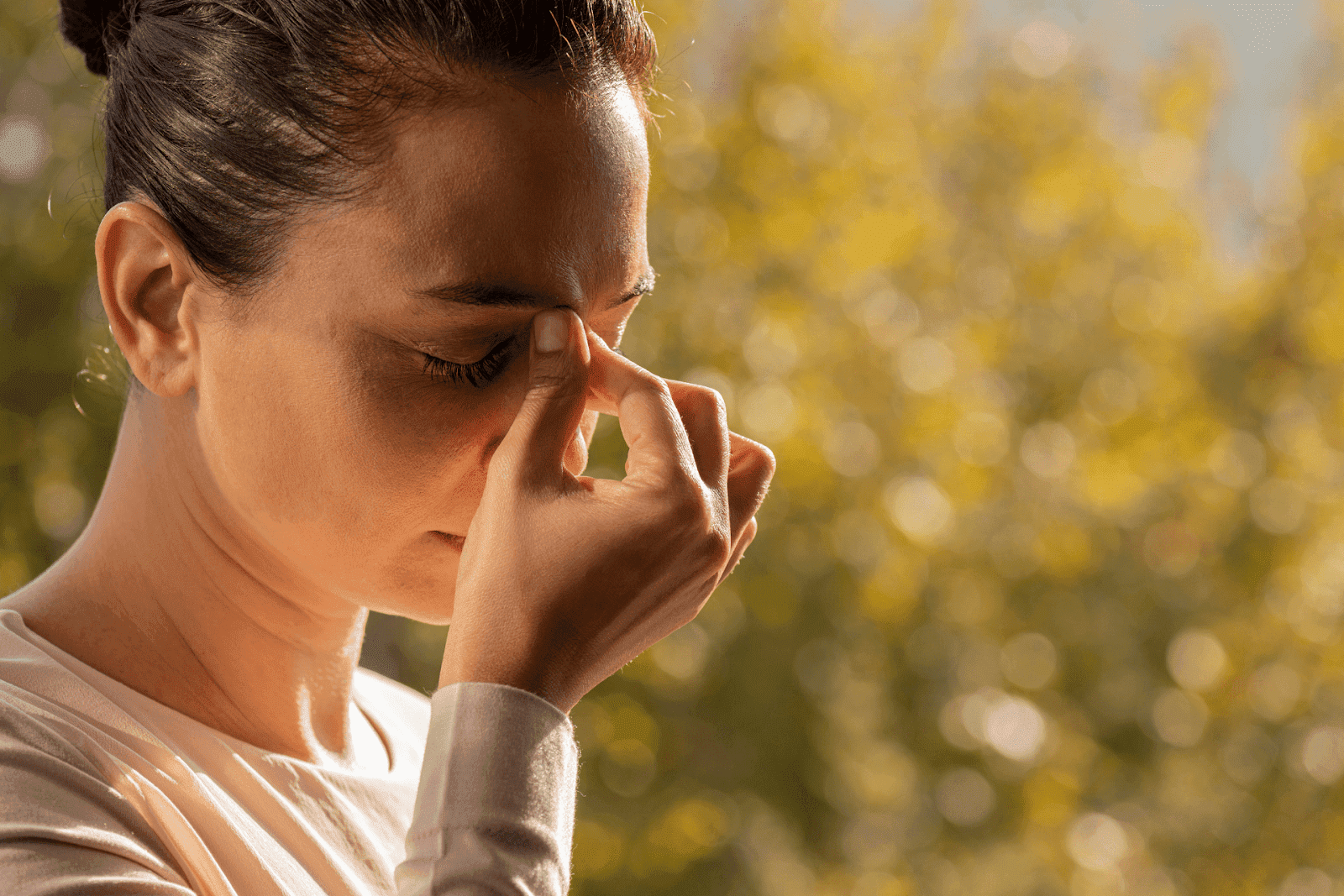How to Treat Allergy Headaches Naturally
Allergy headaches can be a frustrating and painful experience, often disrupting daily life and productivity. These headaches are typically caused by sinus pressure resulting [...]
Read More
Medically reviewed by Alan Lucks | MD, Alan Lucks MDPC Private Practice - New York on October 16th, 2025.
Nasal irrigation with saline solution twice daily, combined with steam inhalation using eucalyptus or peppermint oil, reduces sinus pressure by clearing inflammatory mucus and opening blocked passages.
Anti-inflammatory foods like leafy greens, blueberries, and salmon can reduce headache severity by up to 40% when eaten regularly, as omega-3 fatty acids and antioxidants decrease systemic inflammation.
HEPA air filters remove 99.97% of airborne allergens, while washing bedding weekly in 130°F water kills dust mites and maintaining humidity below 50% prevents mold growth.
Butterbur extract at 75mg twice daily has shown clinical effectiveness in preventing episodes, while quercetin supplements act as natural antihistamines to block allergic reactions.
Seek medical evaluation if headaches occur more than twice weekly, involve severe pain rated above 7/10, or include fever, vision changes, or neurological symptoms like confusion.
Allergy headaches can be a frustrating and painful experience, often disrupting daily life and productivity. These headaches are typically caused by sinus pressure resulting from allergic reactions, and while medications can help, many people seek natural remedies to alleviate their symptoms safely and effectively. Understanding how to treat allergy headaches naturally involves addressing the root causes of allergies, managing inflammation, and supporting overall sinus health.
In this article, we will explore effective natural treatments for allergy headaches, explain why they occur, and provide tips on when to seek professional advice. Additionally, we will highlight how innovative telehealth services like Doctronic.ai can support your health journey with AI-powered primary care.
Allergy headaches usually arise from sinus inflammation caused by allergic reactions to environmental triggers such as pollen, dust mites, mold, or pet dander. When allergens enter the nasal passages, the immune system responds by releasing histamines, which cause swelling and mucus buildup in the sinuses. This swelling increases pressure in the sinus cavities, leading to pain and headaches. The discomfort can range from a dull ache to a more intense throbbing sensation, often making it difficult to concentrate or carry out daily activities.
Unlike tension headaches or migraines, allergy headaches often coincide with other allergy symptoms like nasal congestion, sneezing, itchy eyes, and postnasal drip. Recognizing these signs can help differentiate allergy headaches from other types and guide appropriate treatment. Additionally, allergy headaches may vary in intensity depending on the season and individual sensitivity to specific allergens. For many, the onset of spring brings a surge in pollen levels, which can trigger a cascade of allergy-related symptoms, including headaches.
 Common Allergy Triggers
Common Allergy TriggersIdentifying and minimizing exposure to allergens is a crucial first step in managing allergy headaches naturally. Common triggers include:
Pollen from trees, grasses, and weeds, especially during spring and fall seasons
Indoor allergens such as dust mites and pet dander
Mold spores found in damp or poorly ventilated areas
Strong odors or chemical irritants that may exacerbate symptoms
Beyond these common triggers, certain foods can also provoke allergic reactions that may lead to headaches. For instance, some individuals may experience headaches after consuming aged cheeses, fermented foods, or even processed meats, which contain tyramine, a compound known to trigger migraines in susceptible people. Moreover, environmental factors such as changes in weather, humidity levels, and air pressure can also play a significant role in the frequency and severity of allergy headaches. Understanding these nuances can empower individuals to take proactive steps in managing their symptoms effectively.
In addition to avoiding allergens, many people find relief through various natural remedies and lifestyle adjustments. Staying hydrated, using saline nasal sprays, or employing a humidifier can help alleviate sinus pressure and reduce the likelihood of headaches. Some individuals may also benefit from over-the-counter antihistamines or decongestants, which can help mitigate the body's allergic response. Keeping a symptom diary can also be beneficial; by tracking headache occurrences alongside potential triggers, individuals can gain valuable insights into their specific allergy patterns and responses, leading to more tailored and effective management strategies.
Natural treatments focus on reducing sinus inflammation, clearing nasal passages, and supporting the immune system. Here are some effective strategies to try at home:
Nasal irrigation, also known as a saline rinse or neti pot, involves flushing the nasal passages with a saline solution. This helps remove allergens, mucus, and irritants, reducing sinus pressure and headache pain. Using sterile, distilled, or previously boiled water is essential to avoid infections.
Regular nasal irrigation can provide relief within minutes and improve overall nasal health. It is a safe and inexpensive method that many allergy sufferers find beneficial. Additionally, incorporating a few drops of essential oils, such as tea tree oil, into the saline solution can offer antimicrobial properties, further enhancing the cleansing process. However, it is crucial to ensure that any essential oil used is safe for nasal application and properly diluted.
Inhaling steam helps moisten the sinus passages and loosen mucus, alleviating congestion and pressure. Adding essential oils like eucalyptus or peppermint can enhance the effect, but be cautious with these if you have sensitive skin or respiratory conditions.
Try inhaling steam from a bowl of hot water for 10-15 minutes, covering your head with a towel to trap the steam. This simple practice can ease headache symptoms naturally. For an added benefit, consider using a humidifier in your living space, especially during dry seasons. This not only helps maintain moisture in the air but also reduces the likelihood of allergens circulating, creating a more comfortable environment for allergy sufferers.
Staying well-hydrated thins mucus secretions, making it easier for sinuses to drain and reducing pressure. Drinking plenty of water throughout the day is essential during allergy season.
Incorporating anti-inflammatory foods such as leafy greens, berries, nuts, and fatty fish rich in omega-3 fatty acids may help reduce overall inflammation and support immune health. Avoiding processed foods, excessive sugar, and alcohol can also minimize inflammation and allergy severity. Furthermore, consider adding foods rich in vitamin C, like citrus fruits and bell peppers, which can boost your immune system and help combat allergy symptoms. Herbal teas, particularly those made from ginger or chamomile, can also provide soothing effects while keeping you hydrated.
Some herbal remedies have shown promise in managing allergy symptoms and inflammation. Butterbur and quercetin are two examples that may help reduce histamine release and sinus inflammation.
However, it is important to consult with a healthcare provider before starting any supplements, especially if you are pregnant, nursing, or taking other medications. Additionally, other natural options like stinging nettle and bromelain, found in pineapple, may also offer relief by acting as natural antihistamines and reducing swelling in the nasal passages. Always ensure that you source high-quality supplements from reputable suppliers to maximize their effectiveness and safety.
Reducing allergen exposure indoors can significantly decrease the frequency and severity of allergy headaches. Simple steps include:
Using high-efficiency particulate air (HEPA) filters in your home
Regularly washing bedding and curtains in hot water
Vacuuming with a HEPA-filter vacuum cleaner
Keeping humidity levels low to prevent mold growth
In addition to these measures, consider implementing a no-shoes policy in your home to prevent outdoor allergens from being tracked inside. Regularly cleaning surfaces with damp cloths can also help capture dust and pollen rather than just moving it around. Creating a designated allergy-free zone in your bedroom, where you can retreat for rest, can further enhance your comfort and recovery during allergy season.
While natural remedies can be very effective, it is important to recognize when professional medical care is necessary. If your allergy headaches are severe, persistent, or accompanied by other concerning symptoms such as fever, vision changes, or neurological signs, seek medical attention promptly.
For ongoing allergy management, telehealth services like Doctronic.ai offer convenient access to expert medical advice and treatment options. Doctronic is an AI-powered doctor that synthesizes the latest peer-reviewed medical research to provide fast, personalized care. Whether you need guidance on allergy management or want to discuss treatment options, Doctronic’s telehealth platform is available 24/7 across all 50 states.
 Benefits of Using AI-Powered Telehealth for Allergy Care
Benefits of Using AI-Powered Telehealth for Allergy CareDoctronic’s AI doctor provides several advantages for allergy sufferers:
Speed: Get comprehensive answers and treatment recommendations in seconds without waiting for an appointment.
Accuracy: The AI draws on the most current medical research, ensuring you receive the best possible guidance.
Personalization: Doctronic remembers your medical history and preferences, offering tailored advice every time you use the service.
Prevention is often the best approach to managing allergy headaches. Along with minimizing allergen exposure and maintaining a clean environment, consider the following tips:
Engaging in regular physical activity can boost your immune system and improve circulation, which may help reduce allergy symptoms. Just be mindful of outdoor allergens during peak seasons and choose indoor workouts if necessary.
Stress can exacerbate allergy symptoms and trigger headaches. Techniques such as meditation, deep breathing exercises, and yoga can help manage stress and support overall well-being.
Getting adequate, restful sleep enhances immune function and helps your body recover from allergy-related inflammation. Create a sleep-friendly environment by keeping your bedroom allergen-free and maintaining a consistent sleep schedule.
Allergy headaches can be disruptive, but many natural remedies offer effective relief by addressing the underlying causes of sinus inflammation and congestion. Nasal irrigation, steam inhalation, proper hydration, and a clean living environment are foundational strategies to reduce symptoms. Complementing these with a healthy diet, herbal supplements, and lifestyle adjustments can further support sinus health and prevent headaches.
For personalized advice and convenient access to medical expertise, consider using advanced telehealth services like Doctronic.ai. This AI-powered doctor combines the latest in modern medicine with personalized care, helping you manage allergy headaches and other health concerns quickly and effectively.
By taking a proactive and informed approach, it is possible to minimize the impact of allergy headaches naturally and enjoy better health and comfort throughout the year.
Ready to take control of your allergy headaches with the guidance of the most advanced medical AI? Doctronic is here to offer you personalized, AI-powered care that's fast, informed by the latest medical research, and tailored just for you. With over 10 million satisfied users and the convenience of 24/7 access in all 50 states, our telehealth services are designed to fit your lifestyle. Whether you're seeking a quick AI consultation or a detailed video visit with our doctors, we're committed to providing you with the care you need, when you need it. Skip the line. Talk to an AI Doctor Now, for free.
The most effective approach combines consistent nasal irrigation with environmental allergen control and targeted anti-inflammatory nutrition rather than relying on pain medications alone. Start with saline rinses and HEPA filtration as your foundation, then add herbal supplements for additional prevention. If you're experiencing frequent or severe symptoms, Doctronic can provide personalized treatment guidance.
Allergy headaches can be a frustrating and painful experience, often disrupting daily life and productivity. These headaches are typically caused by sinus pressure resulting [...]
Read More